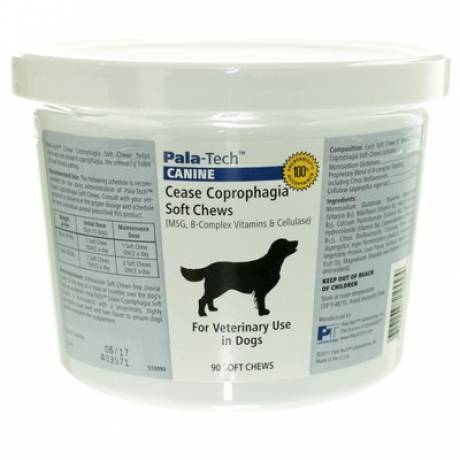
Cease Coprophagia
-
Usually ships the same weekday before 2pm CT.
-
Initial Dose:
Up to 20 lbs: give 1 soft chew twice a day
Over 20 lbs: give 2 soft chews twice a day -
Maintenance Dose:
Up to 20 lbs: give 1 soft chew once a day
Over 20 lbs: give 2 soft chews once a day -
Initial Dose:
Up to 20 lbs: 1/2 scoop (5 grams) twice a day
over 20 lbs: 1 scoop (10 grams) twice a day -
Maintenance Dose:
Up to 20 lbs: 1/2 scoop (5 grams) once a day
over 20 lbs: 1 scoop (10 grams) once a day
What is Pala-Tech's Cease Coprophagia for Dogs and Cats?
- Cease Coprophagia discourages stool eating (coprophagia) by making pets' feces have a bad taste with the ingredient MSG.
- It also includes B complex vitamins, whose deficiency are a potential cause of coprophagia.
- Cease Coprophagia also helps in the breakdown of fiber by using the digestive enzyme cellulase.
Why do cats and dogs use Cease Coprophagia?
- Cease Coprophagia is a supplement for dogs and cats that helps eliminate stool eating (coprophagia)..
What else should I know about Cease Coprophagia?
- Available in soft chews for dogs and granules for dogs and cats.
- Flavored with chicken liver for easy administration.
- Helps prevent stool eating in dogs and cats.
- Makes feces taste undesirable.
- Contains digestive enzymes.
- Includes B complex vitamins.
- Available in soft chews or granules.
What problems could my dog or cat have with Cease Coprophagia?
- Talk to your veterinarian before giving this or any supplement.
How do you use Cease Coprophagia?
- Give as directed by your veterinarian.
- Granules may be applied directly into pets' food.
- Cease Coprophagia should be given to any pet whose stool may be eaten to be effective.
What is in Cease Coprophagia?
- Cease Coprophagia gives stool a bad taste with the ingredient MSG.
- It also includes B complex vitamins, whose deficiency are a potential cause of coprophagia.
Will I get what I see in the picture?
- Cease Coprophagia is a brand name. You will receive the exact brand that you request.
Is it important for my dog or cat to finish all of the Cease Coprophagia?
- Dogs and cats may use Cease Coprophagia for different lengths of time. Please consult your veterinarian if you have any questions.
No Reviews Yet
Q & A
-
We have a Beagle that eats her feces (not always) and a Corgi that never eats feces. If we start using Cease Coprophagia do we need to treat both dogs or just the Beagle? Thanks.?
-
Cease Coprophagia helps discourage this behavior by making the dog's feces taste bad and supplementing with B-complex vitamins and dietary enzymes. For best results, it is recommended that this product is given to all dogs in the household to help resolve the habit.
Verified Answer
-
-
Can this be used for a dog who eats cat poop? Not their own or other dogs just cat?
-
The manufacturer indicates that the active ingredient monosodium glutamate makes your dog's feces undesirable to consumption. This would not directly stop your dog from consuming stools from other animals other than his own. Other pet owners have attempted to remove availability of stools from their pets by utilizing muzzles and leashes in cases where there may be the potential for the pet to come in contact with stools. Thank you, VetRxDirect
Verified Answer
-
-
What is the active ingredient in this product?
-
Louise, Cease Coprophagia contains the following ingredients: Monosodium Glutamate, Proprietary Blend of B-complex Vitamins, including Citrus Bioflavonoids, and Cellulase. Thank you, VetRxDirect
Community Answer
-


